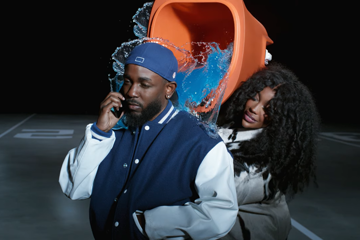It was overkill when Joss Ackland killed one of his henchmen – the oldest trick in the super-villain book, utilised by Darth Vader roughly 75 times – as the South African super-villain in Lethal Weapon 2. He didn't need to slay one of his own to convince viewers that he's evil, all he had to do was open his mouth.
Watching Elysium, nothing's more terrifying about villainous Sharlto Copley than the sound of his voice. “I've always wanted a wife!” he says, leering, stroking Alice Braga's hair with predatory relish; the “wife” coming out sounding, roughly, like “whaaaaaaaahf”. The line is both hilarious and horrifying, as is Copley's performance.
As he blows shit up in ol' homie Neill Blomkamp's futurist parable, he looks like he's having a gay old time, and that delight is just as fun for audiences. But hear him hum a hymn in Afrikaans or talk about being “real puhssst” and there's this almost reflexive revulsion: not even Werner Herzog's hilarious turn in Jack Reacharound has, in 2013, so ably conveyed menace via mere accent.
Perhaps, if seen in a vacuum, Elysium would be an above-average sci-fi thriller with a few winning twists on far-future visions, and some of the most blatant political subtext a Hollywood explosion-movie has ever dabbled in. But coming at the end of a blockbuster season filled with dull, tedious, sombre pictures – in which old red-jocks himself was turned into a joyless Christ figure in The Man Of Steel, and Will Smith played a character trained to feel no emotion in Another Earth (note: watching an actor not emote = not so interesting) – makes Blomkamp's District 9 follow-up feel like a fucking blast.
Don't miss a beat with our FREE daily newsletter
Copley does menace with relish, Wagner Moura chews off even larger chunks of scenery as a wired-up black-market boss, Matt Damon flashes those charismatic pearly whites, Diego Luna looks way cute in a pair of pigtails, and no cities get razed in a climactic fight involving giant robots. Okay, Damon and Copley end up inside bio-mechanic exo-skeletons that aid breaking-shit no end (Damon's affixed in a glorious scene of back-alley butchery in which the 'surgeons' prepare for the operation by getting straight blazed).
But even when a battle-in-heaven breaks out late – when the rebel troops storm the gates of affluent villainy– Blomkamp's picture has none of the faux-weighty portent hung on even the flimsiest of super-hero movies; instead the film is blessed with something resembling swagger,
Elysium's far-future vision goes like this: in 2154, the planet's one-percenters have fled to the titular space-station, that watches down upon the Earth from on heavenly high. It may only be a 20-minute hyper-speed commute, but it's a whole world away: an über-gated-community in which extreme wealth grants its citizens perfect health. Those remaining down on terra firma have it differently: life amongst the teeming masses all shantytown shacks, indentured servitude, facial tattoos, overpopulation, pollution, disease, death, and trucks from Mad Max movies. If any citizens of Earth try crossing over to Elysium, they're returned with extreme prejudice.

After District 9 turned an alien-movie into an apartheid parable, here Blomkamp is using a sci-fi conceit to mount another political parable. In not-particularly-subtle ways, Elysium is America, and Earth – or, at least, dystopian future Los Angeles – is Mexico. The “liberty” of those on the space-station comes protected by Homeland Security (no less), “illegals” are deported under the immigration code, and the Dickensian factory in which Damon toils (assembling the robot cops that oppress him; whoa, irony) may as well just be called a maquiladora.
It's white up above, brown down below; and though those on Earth may yearn for a better life across the border, those in power –chiefly: Jodie Foster in a white suit– turn them away with extreme prejudice, so as to protect the sanctity of the children.
Following the creepily-conservative Iron Man and the non-committal flip-flop politics of the Bat-man, it's actually charming to see a filmmaker so flagrantly stick it to the man; to side with the blue-collar grunt against the corporate overlords, and to put in a commentary on the state of the American health service – only the most wealthy get access to medical treatment – whilst he's at it.

It's so ballsy, so brazen a bit of unsubtle narrative extremism that it makes you not get too fixated on Elysium's many clichés: the unending undercurrent of touching childhood flashbacks riddled with slow-motion and sunsets; a little girl with leukaemia who needs saving and thus makes revenge morally-condonable; a black-market club filled with thudding bass and strobing lights; some mystical-chosen-one bullshit; fights constructed from a surfeit of fidgety edits; and, worst of all, people using 1990s slang in the 2150s.
Copley's catchphrase “that's what I'm talkin' about!” is so anachronistic and awful it could've been spoken by Sam Worthington in Avatar. Of course, spoken with the verbal relish of Copley and his zef goons, even the creakiest clichés come alive. Gleefully cheering them to both kill and be killed, you can only wonder: why doesn't every action blockbuster make its villains wise-crackin' South Africans?

In cinema's annals of unforgettable images, it may not be the fluttering Confederate flag of Gone With The Wind or the blowing plastic bag of American Beauty, but it's just as entrancing: the sight of a beercan swaying, back-and-forth, on the cock-piercing of Ross Knight, frontman of infamous bogan-rockers the Cosmic Psychos.
As Knight stands stark-naked on stage, holding the devil-horns aloft, the devil is in this detail: he isn't literalising the phrase 'swinging dick' out front of his own band, but in front of sludge-metal perennials the Melvins.
Just as Knight has blithely, drunkenly stumbled onto centre-stage at someone else's show, so too did the Psychos blithely, drunkenly stumble into a career: their fuzzed-out novelty songs inspiring a generation of Seattle grunge-rockers, an accidental riff-lifting by L7 leading them, by way of the Prodigy, to fall ass-backwards into a shit-ton of royalty remuneration.
This is how Matt Weston's affectionate rockumentary, Cosmic Psychos: Blokes You Can Trust, plays: a farce about country bumpkins bumbling into accidental success. And yet, as on it goes, and the years unfold, that joke begins to wane, and these suspended-adolescents are forced to grow up: the incursion of addiction and divorce, fatherhood and death, showing that even rock'n'roll's most unreal caricatures aren't insulated from reality.















